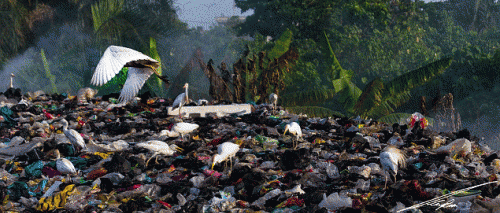Want to Fulfill A Basic Mission of Sustainable Business Thinking? Start Taking Litter into Account in Life Cycle Assessments
One of our principal missions as sustainability practitioners is to introduce broader perspective into business thinking, to reduce impacts and eliminate blind spots and “unknown unknowns.” Today I’d like to offer one small, simple piece of advice for doing this more effectively.

One of our principal missions as sustainability practitioners is to introduce broader perspective into business thinking, to reduce impacts and eliminate blind spots and “unknown unknowns.” Today I’d like to offer one small, simple piece of advice for doing this more effectively.
Wide-angle perspective is important in sustainability consulting like EarthShift Global provides, but particularly central to Life Cycle Assessments. The whole point of LCA is to identify and quantify a broad range of impacts.
This being the case, why do we so often turn a blind eye to an everyday problem that is, literally, all around us? I’m talking about litter, particularly plastic litter.
LCAs typically show little impact from plastic packaging and other items, because we assume they’ll get recycled, placed into sanitary landfills, or incinerated for power. But as the old song says, it ain’t necessarily so.
It’s well documented that more than 8 million tonnes of plastic is introduced into the environment annually, much of it into our oceans. As a ballpark figure, that’s 3 percent of annual plastic production, and the true figure could be higher.
A substantial portion of this comes from countries where disposal facilities are not well established (here’s a good UN Environment infographic on the subject), but because developed nations use so darn much plastic, even a small fraction ending up as litter can have a devastating effect on local wildlife.
And that doesn’t even account for nylon, polyester, and spandex that emanate from clothes washers as garments degrade over time – a significant but usually invisible and unmeasured source of water pollution.
Of course, the vast majority of plastic is disposed of properly, and its environmental costs can be significantly less than materials like glass, aluminum, tin or paper, as documented in a 2016 study commissioned by the American Chemistry Council, Plastics and Sustainability.
But even with that in mind, don’t we owe it to our clients and ourselves to be reality-based?
That brings me to today’s piece of advice: Include leakage in your LCA.
Even if all the impacts of plastics leakage are not documentable, we do know that 2-3 percent ends up outside the proper recycling or disposal channels. Let’s start calling this out for our commissioners as “kg plastic improperly disposed.”
This is not only a way of broadening perspective on real-world conditions, but also a first step toward improving them. If you’ve been in the business for a while, you may recall that before we had modern methods of assessing the impacts of water usage, we would just reference “liters of water consumption.” When we identify and measure, we can start taking meaningful action.
Of course, this commitment shouldn’t stop when we walk out the office door. We can all do more in our personal lives, like minimizing our use of disposable plastic bags, straws, cups, etc.
And we should be encouraging research into potential ocean-degradable plastics, and also development of better sanitation in places that don’t have it. One example is being driven by EarthShift Global client CompiteMAS, a program of the Catholic University of Valparaiso in Chile. It’s a perfect example of how broader thinking creates positive impact: the platform and coaching get small businesses to recycle more and properly dispose of non-recyclables, and the companies in turn encourage their municipalities to do better. And our Sustainability Return on Investment (S-ROI) analysis found that employees brought the knowledge home, expanding the philosophy of waste management throughout the communities where they work.
You can help set the stage for more results like this, and help fulfill our promise of providing broader perspective, by including leakage in your LCA.